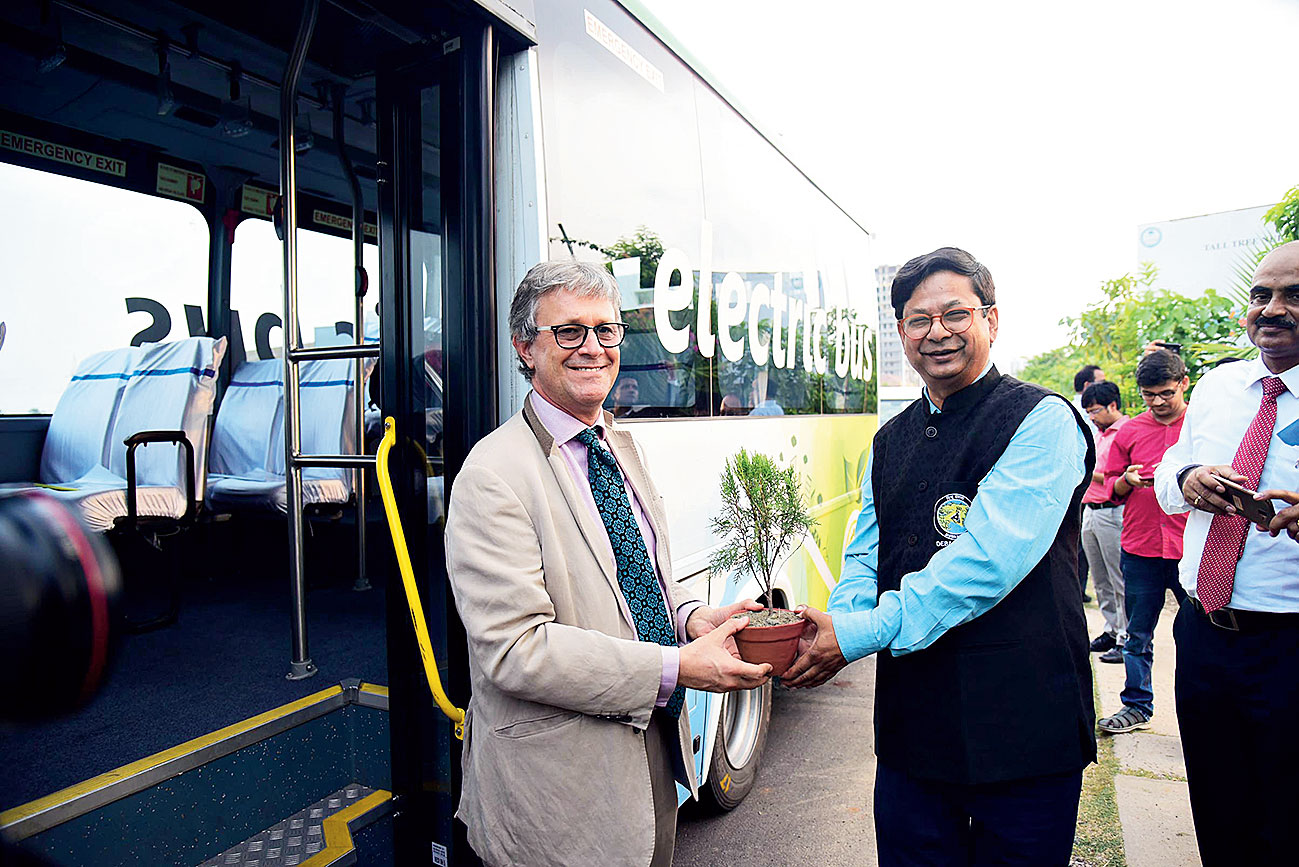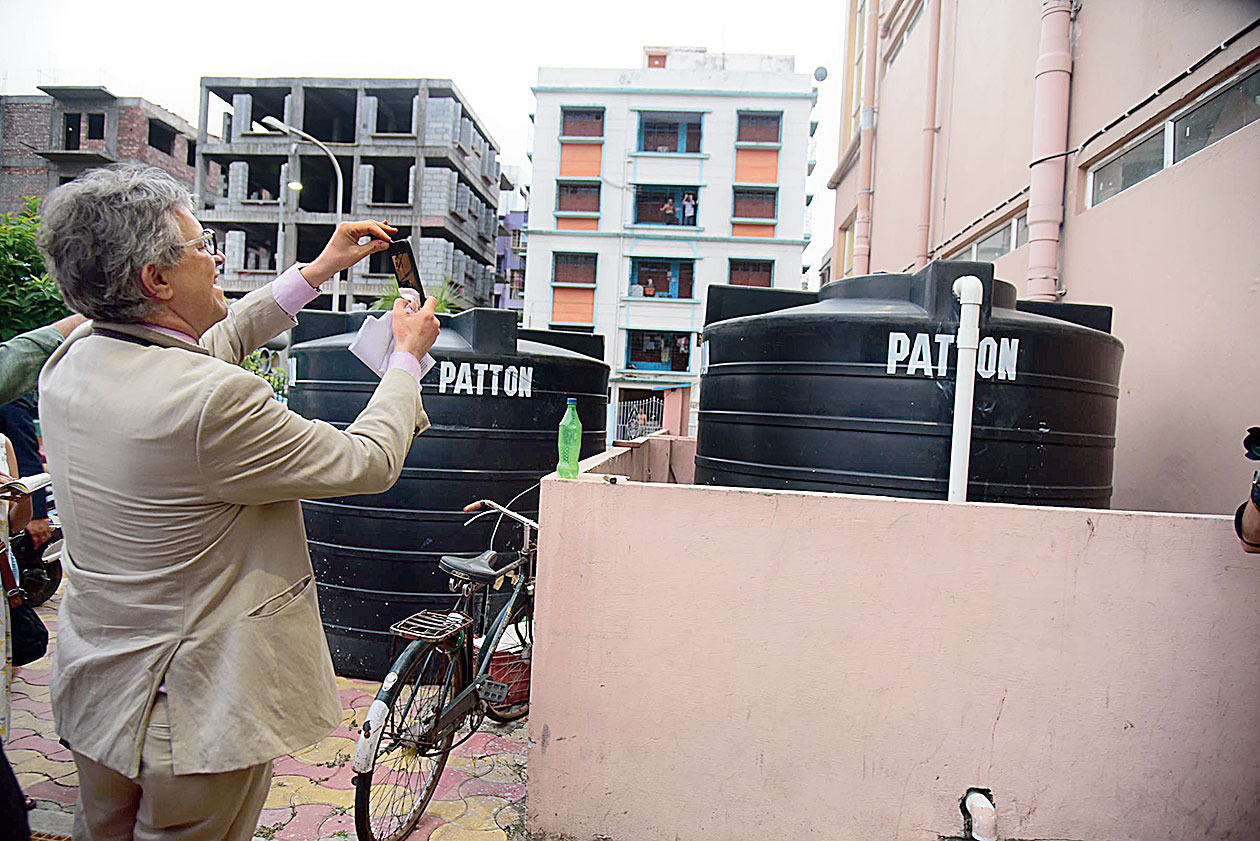
Bucknell clicks the pipes that transport and tanks that contain the water Shubham Paul
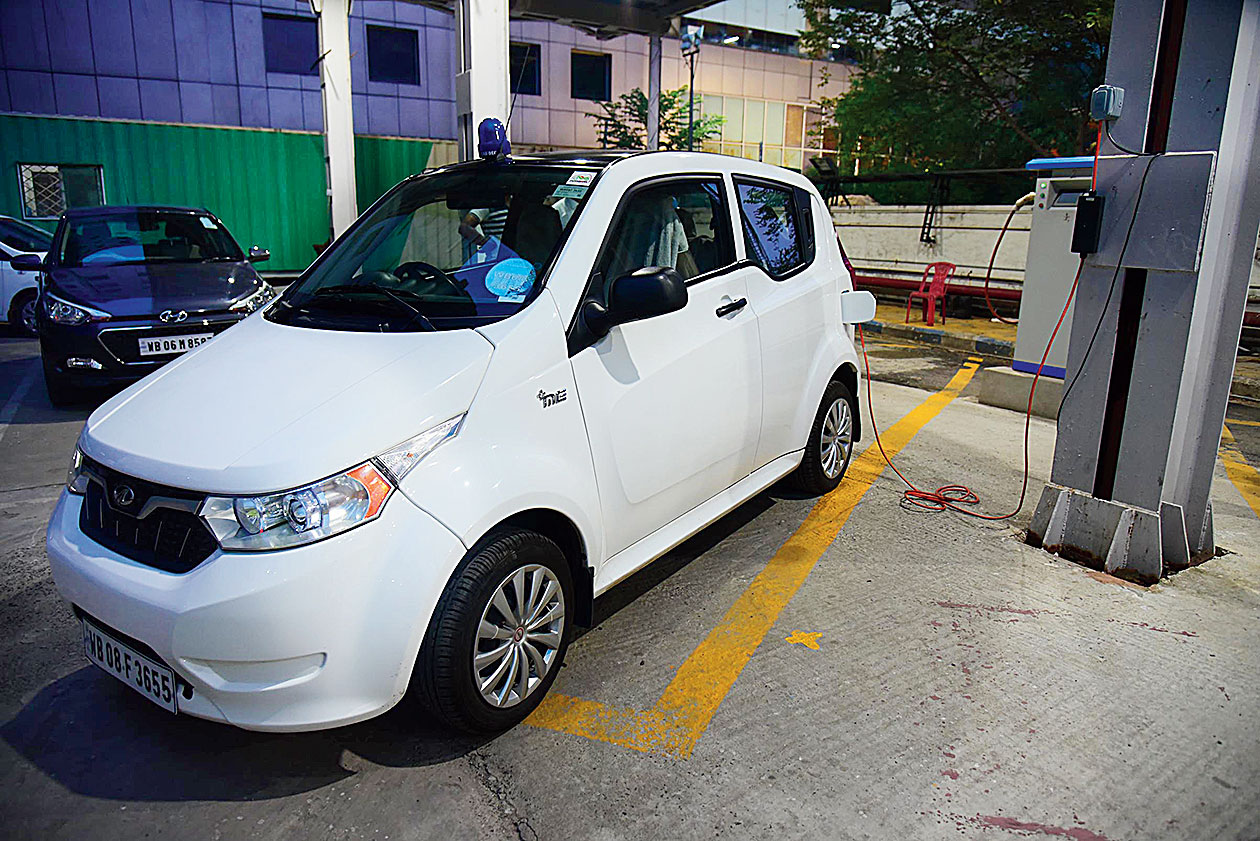
Debashis Sen’s electric car charging at the station Shubham Paul
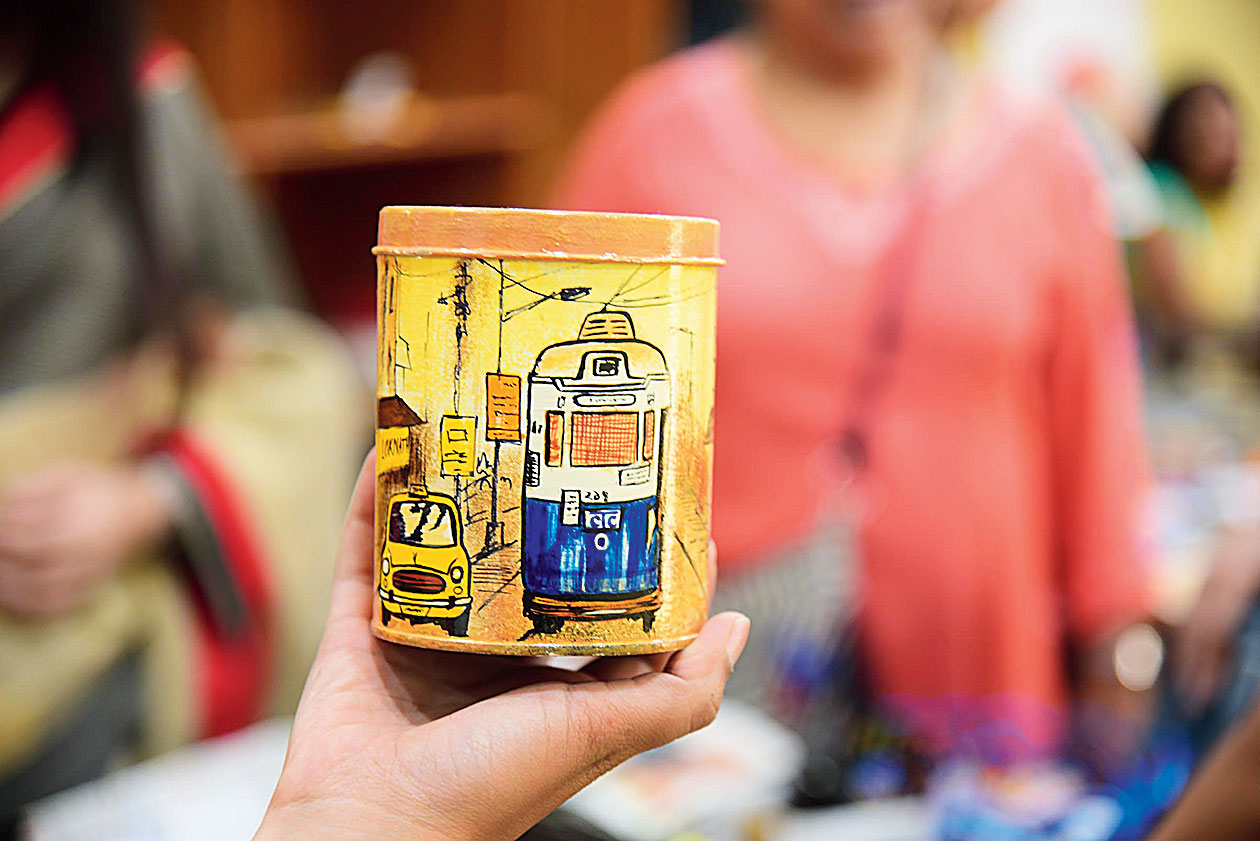
A repainted coconut oil container on sale at Eco Park for Rs 375 Shubham Paul
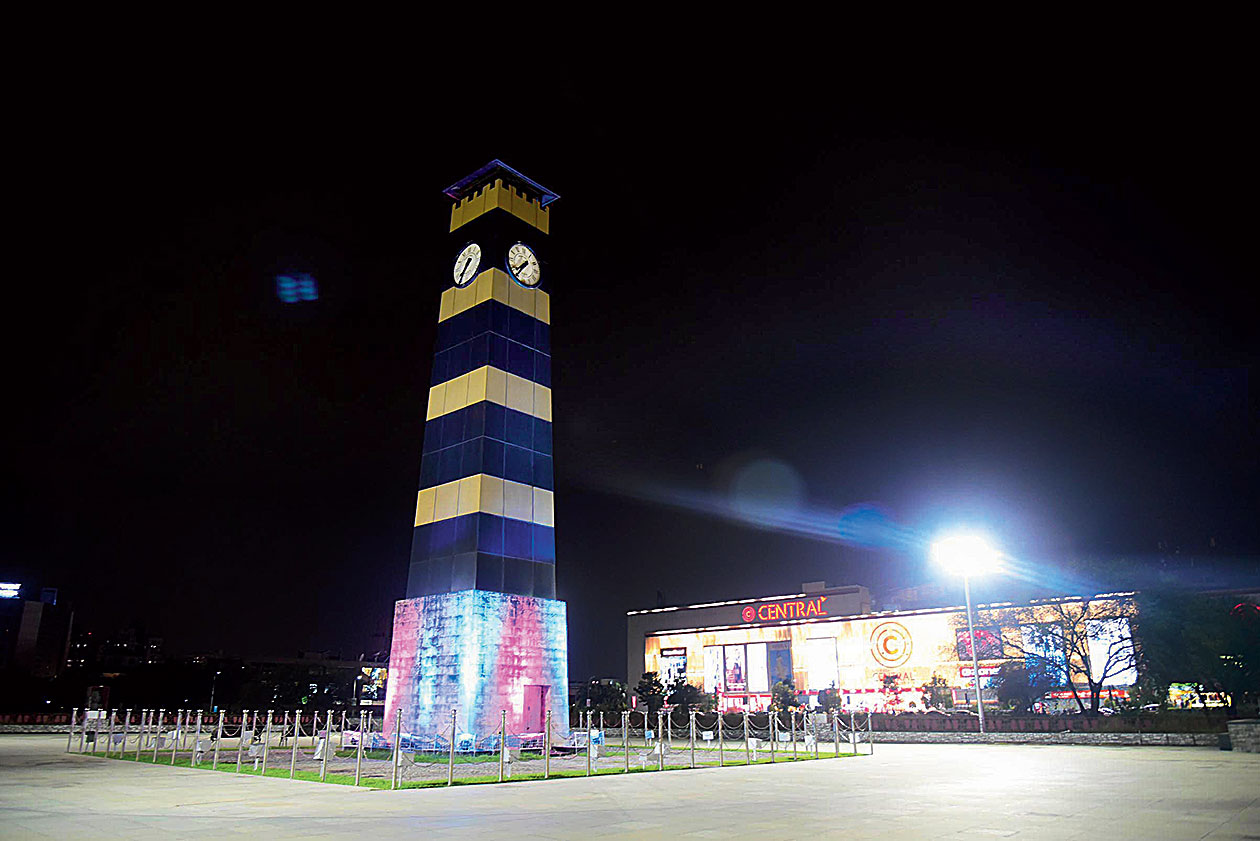
The lights turn on and off on their own, depending on the brightness of the ambience Shubham Paul
New Town had a visitor on the eve of World Environment Day, who travelled by our electric bus to check out the various spots where the authorities have introduced eco-friendly measures: the British deputy high commissioner Bruce Bucknell.
The tour, held in collaboration with Housing and Infrastructure Development Corporation (Hidco), was titled Green Adda on E-Wheels. Hidco chairman cum managing director Debashis Sen played host, showing Bucknell and the other delegates around. The group also included energy experts and environmentalists.
“The UK, in the last 10 years, has gone from very low levels of recycling to very high levels. It saves on cost as well as landfill,” Bucknell stated. “The UK is blessed with lots of wind so we have built wind turbines to produce power. But I’m impressed to see New Town using solar panels widely. The UK has also adopted a Road to Zero Strategy to reduced emissions from road transport and so it’s also reassuring to be travelling by an electric bus for the tour today,” the diplomat added.
The Telegraph Salt Lake went along on the tour. Here’s what we saw —
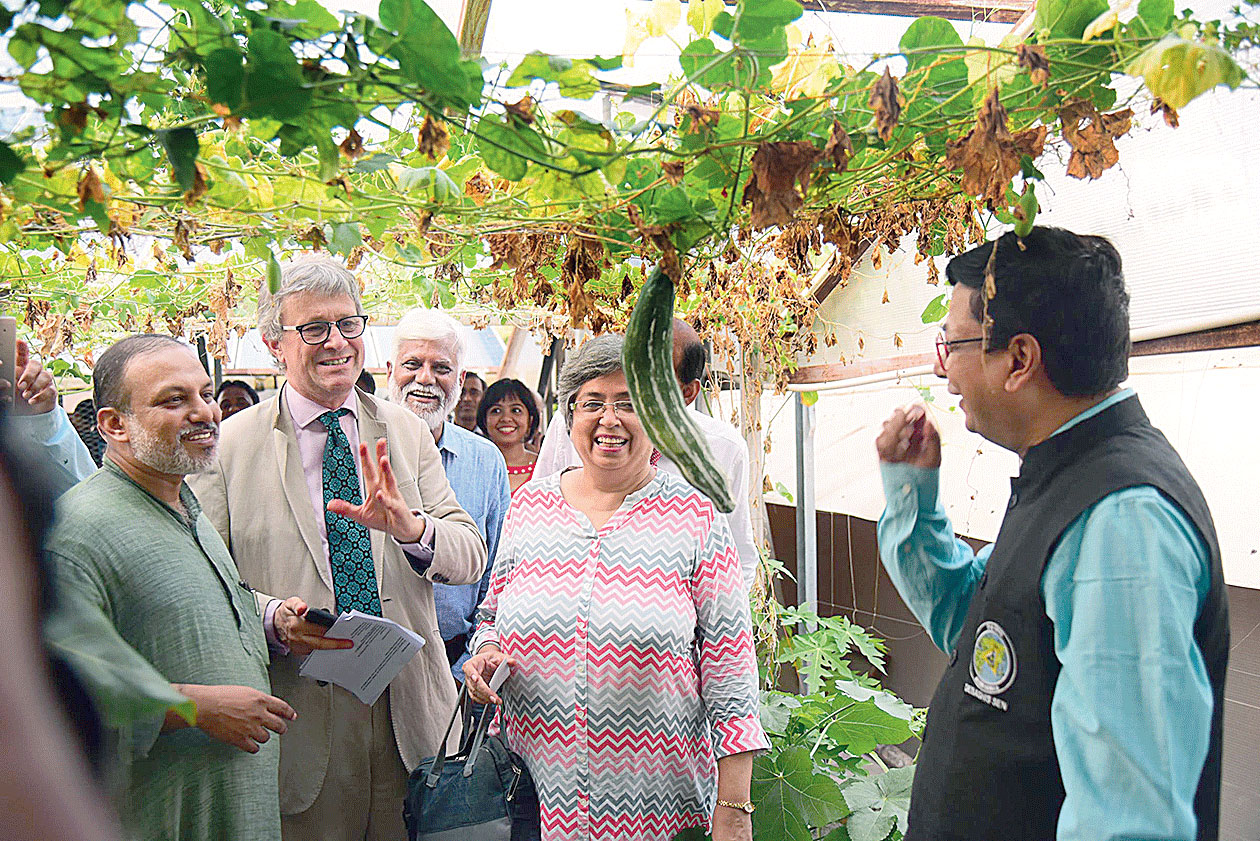
Bucknell amused by a chichinga (snake gourd) Shubham Paul
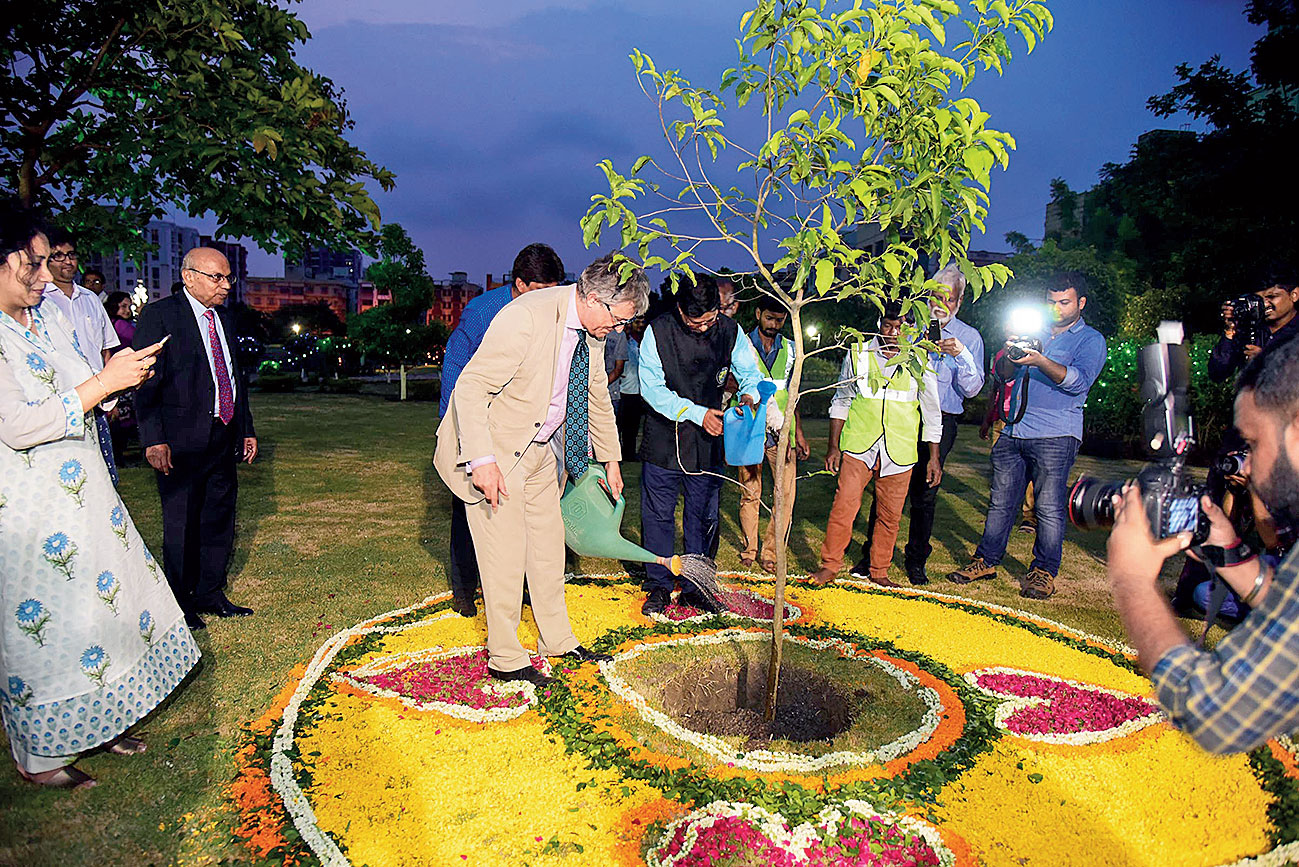
Bucknell plants a Bakul tree at the park, in the middle of a beautiful alpona of petals Shubham Paul
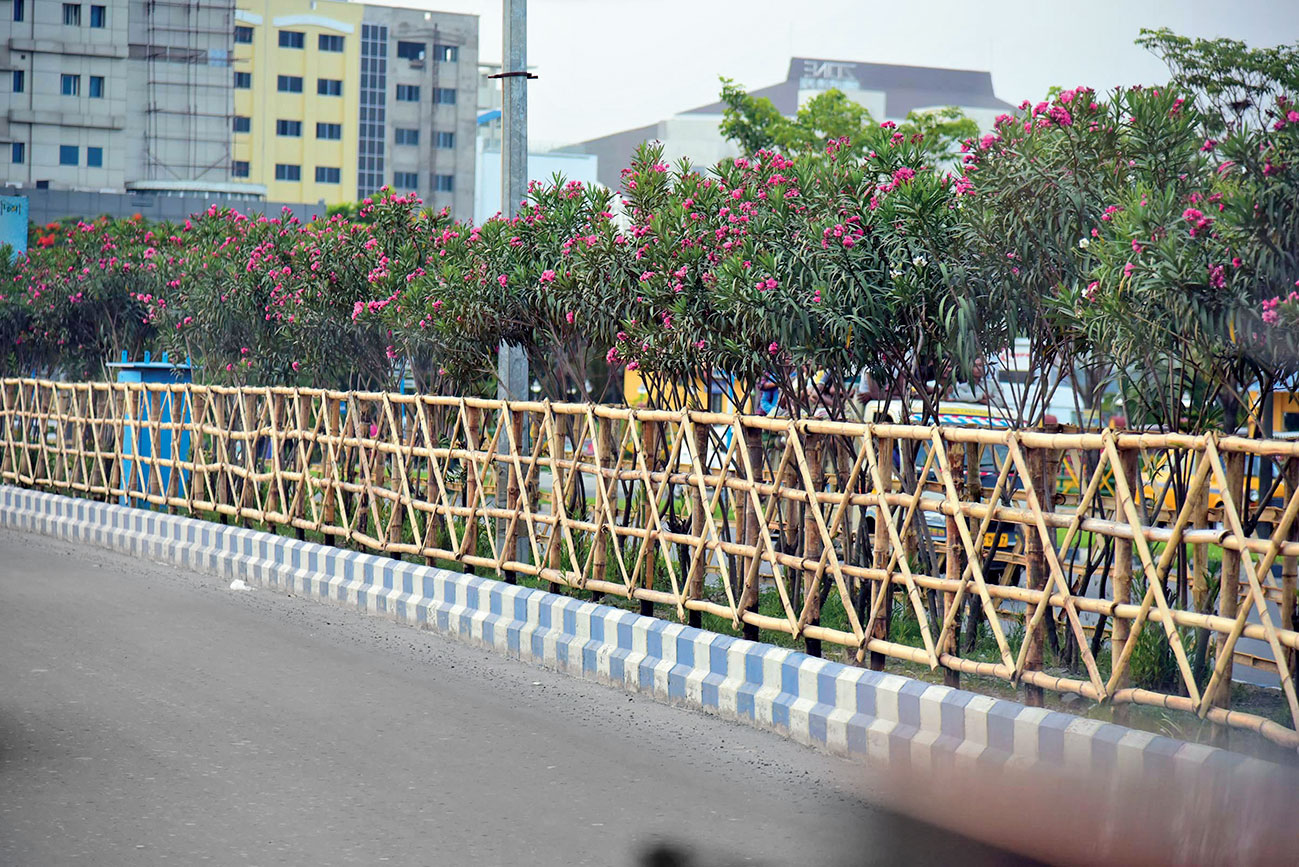
Eco-friendly bamboo fences on the road median Shubham Paul
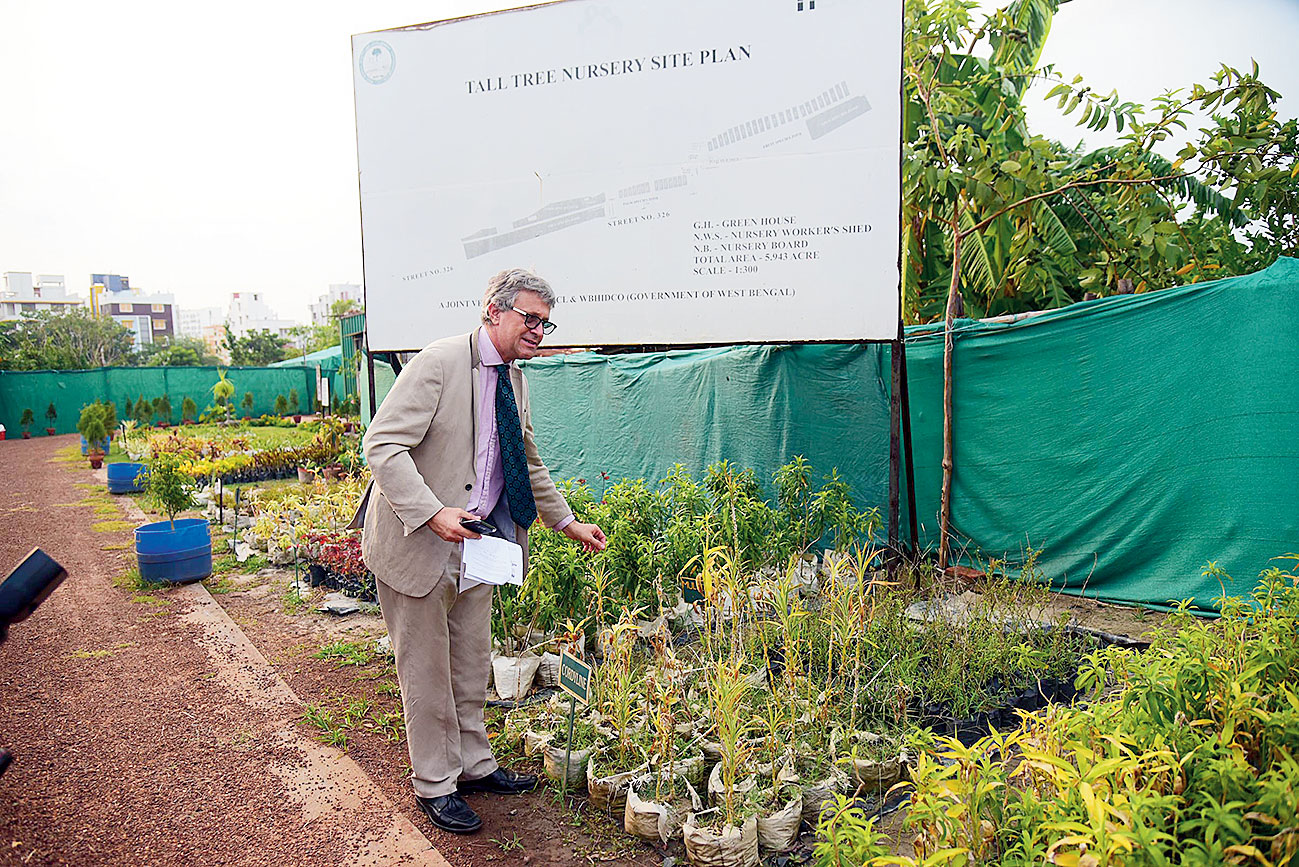
Bucknell inspects some Cordyline saplings Shubham Paul
Spot 2: Solar panels
Spot 3: Bamboo and floral fencing
Spot 6: Rainwater harvesting and composting at CB Market
Spot 7: Electric bus recharging station
Spot 1: Upcycling store
Spot 8: Smart lights around the clock tower
Spot 4: Tall Tree Nursery
Spot 9: Tree plantation at Smriti Bon
Spot 5: Urban farming at CB Market rooftop
Once on board the bus, Sen turned Bucknell’s attention to the solar panels fixed atop the canal flowing along Eco Park. “Since solar panels require a lot of space, we decide to make use of the open space above the water. It has a capacity of 500KW and any excess power produced is uploaded to the electric company’s grid. In the past three years, we’ve saved Rs 92 lakh in electric bills because of this set-up.”
Bucknell was shown a solar dome, an exhibition hall-cum-auditorium coming up in Eco Park, that will be powered entirely by solar panels fixed to its walls. “We expect the structure to be ready by this calendar year,” said Sen.
At the Tall Tree Nursery next to the immersion ghat, forest range officer Biswanath Sengupta showed the flowers, kitchen garden plants, ornamental plants and palms they grow on the 5.94 acre land. “We are the back-up nursery for New Town, Salt Lake, panchayat areas as well as schemes like Sabuj Sree, in which parents of new-born babies are gifted saplings,” said Sengupta.
“Most people want ready-made plants, that require minimum maintenance. So the plants are nurtured here by experts and then handed over to buyers,” said Sen.
The greens reminded Bucknell of his own garden back in England. “We have apples, pears, plums, growing there and I hope our tenants are looking after them well! Being unfamiliar with tropical plants, I haven’t done much gardening here in my Alipore home yet.”
The next stop was CB Market, near Novotel, where the rooftop has been turned into a farmland of sorts, growing everything from Papayas and Pomegranates to Gourds and Pumpkins.
Bucknell was full of questions and to answer them was Kunal Deb, director of Owl Spirit, a company formed by the NGO Uthnau that began the urban farm on the top floor.
“To protect the roof, we have used cocopeat instead of soil to reduce the weight of the pots. And we have replaced pots with the much-lighter bamboo baskets and placed wheels underneath them for easy movement,” explained Deb.
The produce is on sale at the Sufal Bangla store on the ground floor and stall-keepers say they have healthy demand. Prices are about 10 per cent higher than regular vegetables.
The terrace also has solar panels. “When the team said they needed a shed to protect plants against the harsh rays of the sun, I suggested installing solar panels instead. Engineers had to work hard to ensure the panels survived wind pressure but ultimately it has worked out fine,” said Sen.
The penultimate stop, before concluding at Biswa Bangla Gate, was Smriti Bon, diagonally opposite Pride Hotel. At the lake here, Sen showed floating solar panels. “We have installed panels of 10KW on plastic cubes floating on the water,” he said. Bucknell also planted a Bakul tree at the park, in the middle of a beautiful alpona of petals.
Sen showcased the simple bamboo fencing on the medians along the Major Arterial Road. “These use 65 per cent less energy than steel fences and were praised by the Indian Green Building Council (IGBC), that awarded us with gold certification for our initiatives last year,” he said.
He also shared how an edge of Eco Park is bordered by a polluted canal that comes from Barrackpore and which Hidco wanted to block from the view of visitors. “But instead of building a brick wall, we decided to build a Bougainvillea fence that is both eco-friendly and beautifying,” Sen explained.
Bucknell saw how pipes carry rainwater from the terrace of CB Market to the two 5,000l tanks on the ground floor. “We collect about 40 per cent of the total rainwater we receive as we can neither store nor do we require more than that at present,” said Deb. “The water undergoes charcoal treatment in the pipes itself to purify it.”
They also have a semi-automatic composter machine that shreds organic waste dumped into it, such as discarded vegetables and fruits from the shops.
“The waste decomposes faster if it is in bits,” said Sanghamitra Mukherjee, waste management consultant for NKDA, who couldn’t be present when Bucknell visited but who has set the unit in place.
Microbes and sawdust are added to the shreds and then kept in crates for a month to decompose into compost.
Bucknell ran his hands through the mixture, noting that there was no odour and that there were tiny mushrooms growing in the crates that were about two weeks old. “Mushrooms only grows if the mixture is healthy,” said Deb.
The compost being produced is being used in the rooftop farm as well as in parks and gardens of the township. About 100kg of waste inserted into the machine yields about 30kg of compost.
The group drove into the electric bus recharging station behind Pride Hotel and saw Sen’s electric car — the Mahindra e2o — charging.
“The first time I rode an electric bus was in London in 2011 along with the chief minister,” said Sen. “But the first time I rode an air-conditioned electric bus was here in New Town.”
There are three electric buses in New Town at present and Hidco plans to acquire three more. “The transport department is acquiring more such buses too for long distance travel to places like Howrah and Garia,” said Sen, showing a glimpse of the transport department’s ongoing work for the project at the same site.
The bodies of the electric buses in New Town have been built by automobile maker Eicher and the technology is by Pune-based company KPIT. Atul Tare, associate vice president- alternative powertrain solutions, KPIT, had come down from Pune to brief Bucknell.
“The three buses here have covered a combined distance of 1,75,000km and carried roughly an equal number of passengers,” said Tare. “We have three charging stations where the buses charge for about five hours overnight and two fast charging stations for ‘top up’ charge on the go.”
Bucknell was quite impressed by the bus. “In the big cities of the UK, public transport is convenient and cost-effective but experiments are on to find the most feasible and eco-friendly way to power them, including electric, bio-fuel and hydrogen cells,” said Bucknell.
The meeting point of the gathering was the recently-opened recycling and upcycling corner of Eco Park, through Gate 4. Here, delegates browsed through fridge magnets, paper weights and mobile holders made of old clothes.
“This is prime property that we have let out for free to three groups to sell upcycled products. It will be on rotational basis, to give everyone a chance,” Sen told Bucknell, who took keen interest in the compost-making mixes sold by SN Greenovation.
“It’s barely been a month since we set shop here and we’ve already sold items worth more than Rs 25,000, not to mention bulk orders of items like newspaper bags,” said Sourav Mukherjee of Kolkata Society for Cultural Heritage.
NKDA itself has a stall that offers second hand clothes at prices as low as Rs 20. “Even this is selling one item a day on an average,” smiled salesperson Krishna Das. “The other day when it rained customers ran into the store for shelter, drenched. Seeing the price tags of the clothes, they bought them, changed into them and walked home wearing new clothes.”
As the bus veered around the clock tower in front of Central Mall, Sen pointed at the lampposts around it. “These lights are fitted with censors that turn on and off on their own, depending on the brightness of the ambience.” They use LoRaWAN (Long Range Wide Area Network) technology. “However, the lights are also connected by cloud system and can be controlled using laptops far away,” said Sen.

